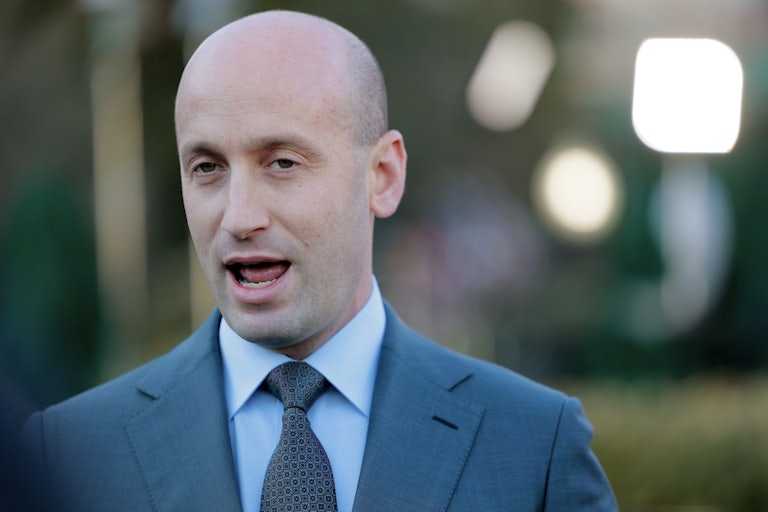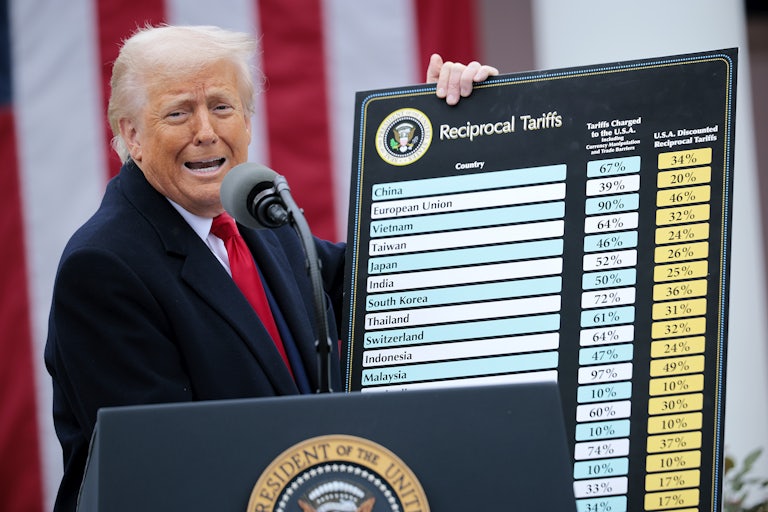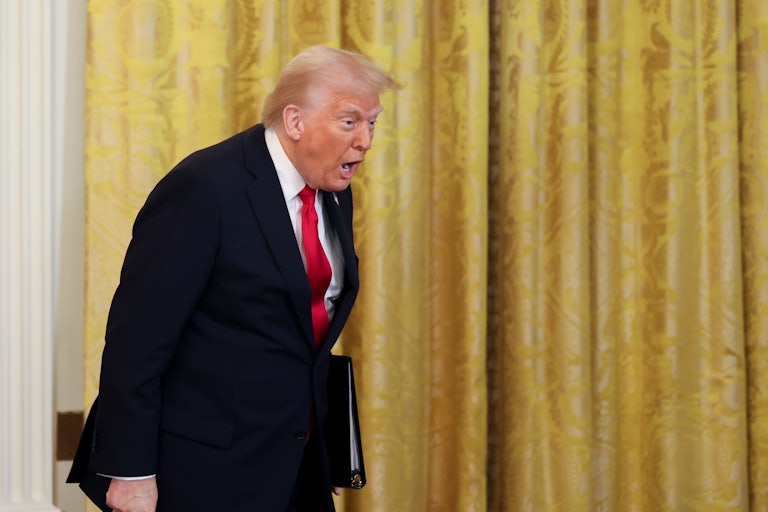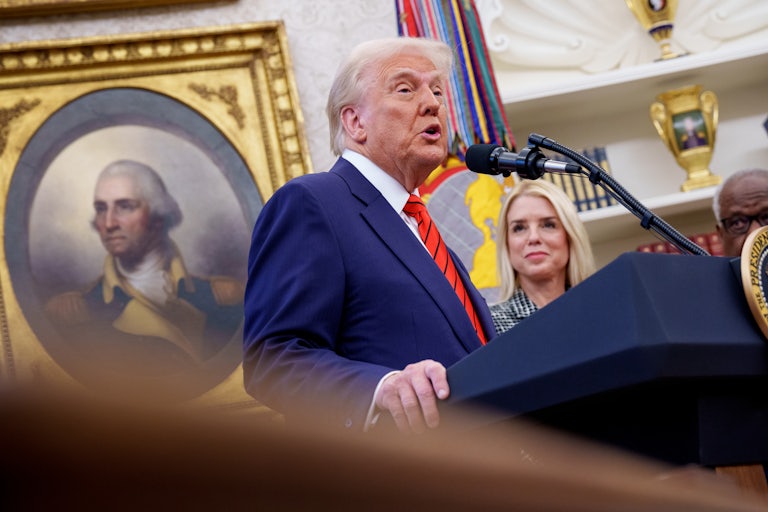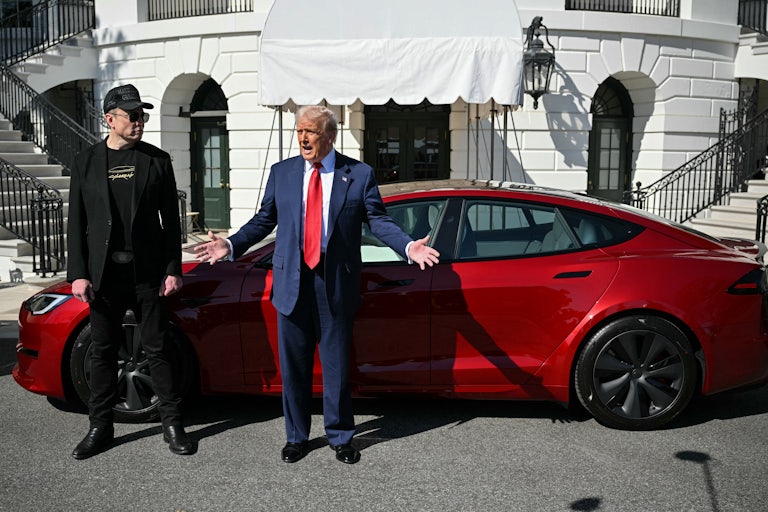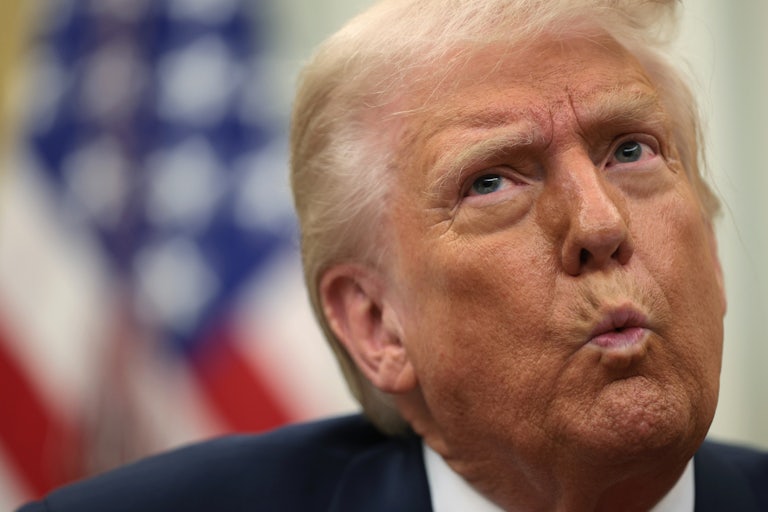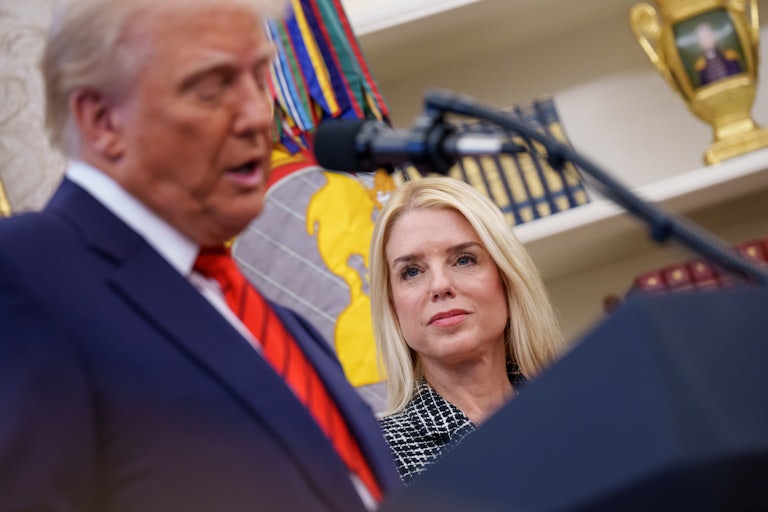Trump Just Did the Most Corrupt Thing Any President Has Ever Done
He’s using the White House to get rich from anonymous investors—and it’s hardly even a news story.

Imagine that Joe Biden, just as he was assuming office, had started a new company with Hunter Biden and used his main social media account to recruit financial backers, then promised that the most generous among them would earn an invitation to a private dinner with him. Oh, and imagine that these investors were all kept secret from the public, so that we had no idea what kinds of possible conflicts of interest might arise.
Take a minute, close your eyes. Let yourself see Jim Jordan’s face go purple in apoplexy, hear the moral thunder spewing out of Jesse Watters’s mouth, feel the shock (which would be wholly justified) of the New York Times editorial board as it expressed disbelief that the man representing the purported values and standards of the United States of America before the world would begin to think it was remotely OK to do such a thing. The media would be able to speak of nothing else for days. Maybe weeks.
Yet this and more is what Donald Trump just did, and unless you follow the news quite closely, it’s possible you’ve not even heard about it. Or if you have, it was probably in passing, one of those second-tier, “this is kind of interesting” headlines. But it’s a lot more than that. As Democratic Senator Chris Murphy noted Wednesday: “This isn’t Trump just being Trump. The Trump coin scam is the most brazenly corrupt thing a President has ever done. Not close.”
Trump announced this week that the top 220 buyers of his $Trump (strump, as in strumpet) meme coin between now and mid-May will be invited to an exclusive dinner on May 22 (“a night to remember”) at his golf club outside Washington, D.C. The Washington Post and other outlets have reported that in the days since the announcement, “buyers have poured tens of millions of dollars” into the coin; further, that the holders of 27 crypto wallets have acquired at least 100,000 coins apiece, “stakes worth about a million dollars each.” Holders of crypto wallets are anonymous, if they want to be, so the identities of these people (or businesses or countries or sovereign wealth funds or whatever they might be) are unknown and will presumably remain so until the big dinner or, who knows, maybe for all time.
It’s also worth noting that Trump launched this meme coin just a few days before inauguration. Its value quickly shot up to around $75. It steadily declined through the first month of his presidency, and by early April, as Americans grew weary of a president who was tanking the economy, it had fallen to $7.14.
Mind you, a meme coin is a thing with no intrinsic value. It’s just some … thing that somebody decides to launch based on hype because they can get a bunch of suckers to invest in it. As Investopedia gingerly puts it: “Most meme coins are usually created without a use case other than being tradable and convertible.” It should come as no surprise that some meme coins are tied to right-wing politics. Elon Musk named his Department of Government Efficiency after his favorite meme coin, dogecoin (which, in turn, was indeed named after an actual internet meme in which doge is slang for a Shiba Inu dog).
So, to go back to my opening analogy—this isn’t even like Joe and Hunter Biden starting a company from the White House. A company is a real thing. It makes a product or provides a service. It files papers with the Securities and Exchange Commission. It pays taxes. It employs people. Assuming that it’s a good corporate citizen and that it exists at least in part to solve some problem or offer the public some innovation, it contributes to the general welfare.
Not so a meme coin. It’s just a hustle. It may make certain investors rich, but it does the world no good whatsoever.
So stop and think about this. First, Trump, preparing for the presidency, purportedly busy thinking about how many millions of people he’s going to deport and how he’s going to bring “Jina” to its knees and how he’s going to hand eastern Ukraine to Putin and how he’s going to cut Meals on Wheels, for Chrissakes, takes time out from all that to stop and think: Now, how can I profit from returning to the White House? So he launches, naturally, the griftiest Christmas present ever.
It starts out great. Then its value drops by 90 percent. So in April, while he’s illegally deporting legal U.S. residents to El Salvador and roiling the world’s financial markets, he stops and takes the time to think: Hey, what happened with my meme coin? I had better figure out a way to goose this grift. So he comes up with this dinner. As well as showing just how tawdry his mind is, how he just automatically and intrinsically thinks it’s his right to make a buck from the presidency, it’s unspeakably corrupt. (One small silver lining here is that after peaking Wednesday at almost $15, it’s now under $12.)
Who knows who these “investors” are? Will we ever know? Inevitably, on May 22, people will be invited to that dinner. Will we know the guest list? Will the list be sanitized? Will a few Russian oligarchs be among the top 220 but send surrogates to keep their identity hidden?
This doesn’t create the “appearance” of corruption or set up the “potential” for conflict of interest. It is corruption, and it’s a standing conflict of interest. Patently, and historically. Chris Murphy is right: This is the most corrupt thing any president has ever done, by a mile.
What are the others? Watergate? It was awful in different ways, but of course Trump is worse than Richard Nixon in all those ways too. Teapot Dome? Please—a tiny little rigged contract, and it didn’t even involve Warren Harding directly, just his interior secretary. Credit Mobilier? Run-of-the-mill bribes by a railroad company, again not involving President Grant directly, just his vice president.
And yes, I’ve been thinking this week of the Lincoln Bedroom scandal. In 1995–96, the Clintons invited a lot of people to spend a night in the famous chamber. Many of them made large donations to the Democratic Party. It was unseemly. But it wasn’t illegal. And it certainly didn’t line the Clintons’ personal pockets. But if you were around at the time, you remember as I do the swollen outrage of Republicans about how relentlessly corrupt the Clintons were.
Today? Crickets.
Finally: Before we leave this topic, I want you to go to GetTrumpMemes.com and just look at those illustrations of Trump. There’s a big one in the middle of him with his fist raised, echoing the image from his attempted assassination. Then off to the right, there’s Trump seated at the head of a dining table.
In both, he looks about 50. The artist has airbrushed a good quarter-century off his face, in terms of jowl fat and wrinkles and accumulated orange pancake. And in the dominant, middle image … what do we think Trump’s waist size is, about 46, 48? This Trump is about a 34. Maybe even a svelte 32. It’s hysterically funny. These are probably the most creepily totalitarian images of Trump I’ve ever seen, and yes, I understand, that’s a big statement. But even Stalin’s visual hagiographers didn’t try to make him look skinny.
I digress. Let’s keep our eyes on the real prize here. This May 22 dinner is a high crime and misdemeanor. A president of the United States can’t use the office to enrich himself in this way, from potentially anonymous donors for whom he might do favors. This is as textbook as corruption gets.
New York Times and Washington Post, put your best investigative reporters on this and place their stories on your front pages. MSNBC, hammer on this—you haven’t been. Democrats, talk about this every day, several times a day. Do not let Trump’s sewer standards jade us. Make sure the people know.
This article first appeared in Fighting Words, a weekly TNR newsletter authored by editor Michael Tomasky. Sign up here.

